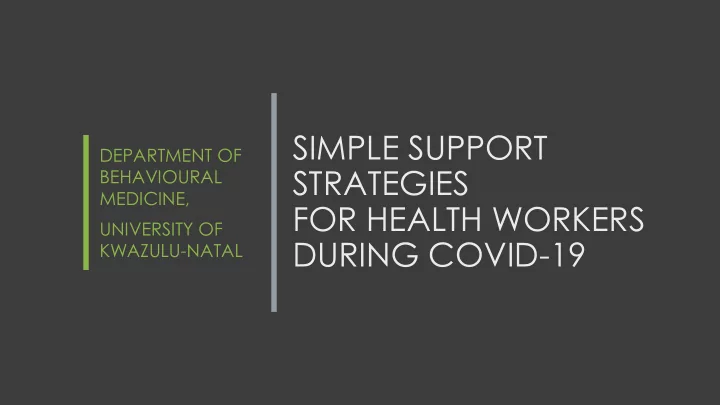

SIMPLE SUPPORT DEPARTMENT OF STRATEGIES BEHAVIOURAL MEDICINE, FOR HEALTH WORKERS UNIVERSITY OF DURING COVID-19 KWAZULU-NATAL
Get ONLY the information you need ACCESSING By now you probably have what is needed INFORMATION, Try to avoid obsessive info searches Avoid information over-load THE MEDIA Seek & trust only legitimate media sources AND SOCIAL E.g. WHO, NIH, Mayo Clinic, etc. Limit social media – at times these MEDIA can be unhelpful and destructive Provide information (without close RESOURCES contact) to those less informed Ensure your domestic helper has the relevant information
INFORMING OTHERS LESS FORTUNATE THAT YOU Provide information (without Ensure your domestic Help her / him to formulate Provide simple information contact) to those less helper has the relevant ways to inform dependents: on informed information Children Prevention Elderly Steps if infection suspected
Cough/sneeze Social distancing Handwashing etiquette ENSURE THAT YOU TEACH THE Remember providing too much information BASIC Disinfecting surfaces is a bad idea as it: Avoid touching face at home • Confuses PREVENTION • Creates unnecessary panic MEASURES Help enable the Coronavirus Hotline 0600123456 number on their phones
Altruism is most effective in times like this The practice has been found to be helpful to ALTRUISM IN both parties TIMES OF CRISIS OR DISASTER A sense of comfort & satisfaction Part of the citizenry Those providing help feel Part of the solution Useful and needed Being cared about Those receiving help feel Restores faith in fellow citizens a sense of community Feels part of the community
HEALTH CARE WORKERS Please remember that: You are not immune to the virus or to concern about it It’s normal to be concerned about yourself, your family, your patients Remind yourself that concern ≠ over -concern / obsession Draw an imaginary line to ensure you don’t cross that threshold Always remind yourself what you learned early in your training In times of crisis – do the basics right By doing the basics right – you will be an efficient health worker Do the best you can – you cannot do more than that
THE ANXIETY OF THE TIMES Remember that these In unusual times So – its okay to feel a are extraordinary anxiety is normative little anxious times Remind yourself that This is a new situation Remind yourself that everyone around you for all of us in this nobody has all the is feeling anxious generation answers at this time A little anxiety is good It also helps us be a to get us going (like bit more careful and when writing exams) attentive
If the anxiety gets a bit much Take some time out to manage it Take a short break from the situation, work etc. WHEN THE Take some time to focus on something else, e.g. tend to your ANXIETY GETS pot plant, etc. Talk to a colleague Take a coffee/tea break TOO MUCH Distraction / time away helps re- energise, improve focus as well Consider arranging to consult a mental health colleague
If you have an effective routine to manage anxiety use that, otherwise Consider starting a new approach such as: Breathing & relaxation exercises – MANAGING several simple techniques are available on the web Meditation – several simple ANXIOUS techniques are available on the web Yoga – several simple techniques are available on the web FEELINGS Tending to your hobbies Mindfulness If applicable, spiritual engagement Connect (electronically) with friends and relatives to see how they’re doing Any technique that works for you in a constructive way
Avoid getting into the complicated stuff at this stage Use simple strategies that are known to work Very similar in process to meditation Focus on breathing & feel each breath Involves focusing on the present (breathing) Avoiding feeling judgmental about thoughts MINDFULNESS that may intrude Keep focus on the present Some useful websites: https://www.mayoclinic.org/healthy- lifestyle/consumer-health/in- depth/mindfulness-exercises/art-20046356 https://news.harvard.edu/gazette/story/201 8/04/less-stress-clearer-thoughts-with- mindfulness-meditation/
LET’S MANAGE THE COVID -19 SITUATION IN A WAY THAT Is most effective Creates least panic Is based on scientific evidence Is geared towards the wellbeing of all Shows your commitment to evidence-based care: If you are unsure about plans of action, consult others Don’t feel the need to give immediate answers Ask others, especially senior colleagues Give advice that is evidence-based & compassionate
Avoid focusing on the virus numbers across the planet REMEMBER, You cannot control that, even though it saddens us PANIC THRIVES Focus on your small area of work Focus on your patient’s needs ON FEELING A Focus on how your patient feels & expresses her/his discomfort LOSS OF Focus on your family You have some control over those CONTROL, SO: areas Look at what you can do to keep those areas working & safe
Give as much info as they can assimilate Protect & keep them safe – but don’t overprotect Avoid under-informing or over-informing children WHAT ABOUT Show your concern about the virus situation – that will help them take it seriously But avoid exhibiting panic – this creates OUR insecurity in children In the event of home confinement: create structure, normalise within the constraints of CHILDREN? prevention, keep them occupied Useful literature: https://www.thelancet.com/action/showPd f?pii=S0140-6736%2820%2930547-X
Routines are helpful for all of us Routines keep us feeling grounded & more secure DEVELOPING Routines are crucial for children’s feelings of security AND Have a set plan of things to do, whether at home or at work Develop a structure for children, MAINTAINING especially if not at school Plan homework routines A ROUTINE Plan play times Use lockdown periods to increase family togetherness
MOST IMPORTANTLY …. Take the lead from our Don’t be like one of the Be measured in your nation’s President who world leaders who gives response, advice and thinks carefully, consults, incorrect, possibly opinions and then acts dangerous advice If in doubt, say “I don’t Remember we don’t know – I’ll find out from know everything colleagues”
Recommend
More recommend